Abstract
We have assessed the effects of screening and genetic counseling for beta-thalassemia trait on knowledge, attitudes, and behavior in a prospective, controlled study of randomly selected adult members of a health maintenance organization. We report here that knowledge of manifestations and of inheritance of thalassemia, previously reported to be high immediately after counseling, were well maintained at 2 and 10 months following counseling. There was no detectable impairment of self-concept. Marital adjustment improved, and sexual activity increased significantly. Mood, assessed immediately before and after counseling, showed no undesirable changes. A patient-structured counseling method, designed to minimize negative psychological effects via discussion of feelings, was not superior to conventional and programmed methods, described in our previous reports, in terms of learning or attitude change.
Full text
PDF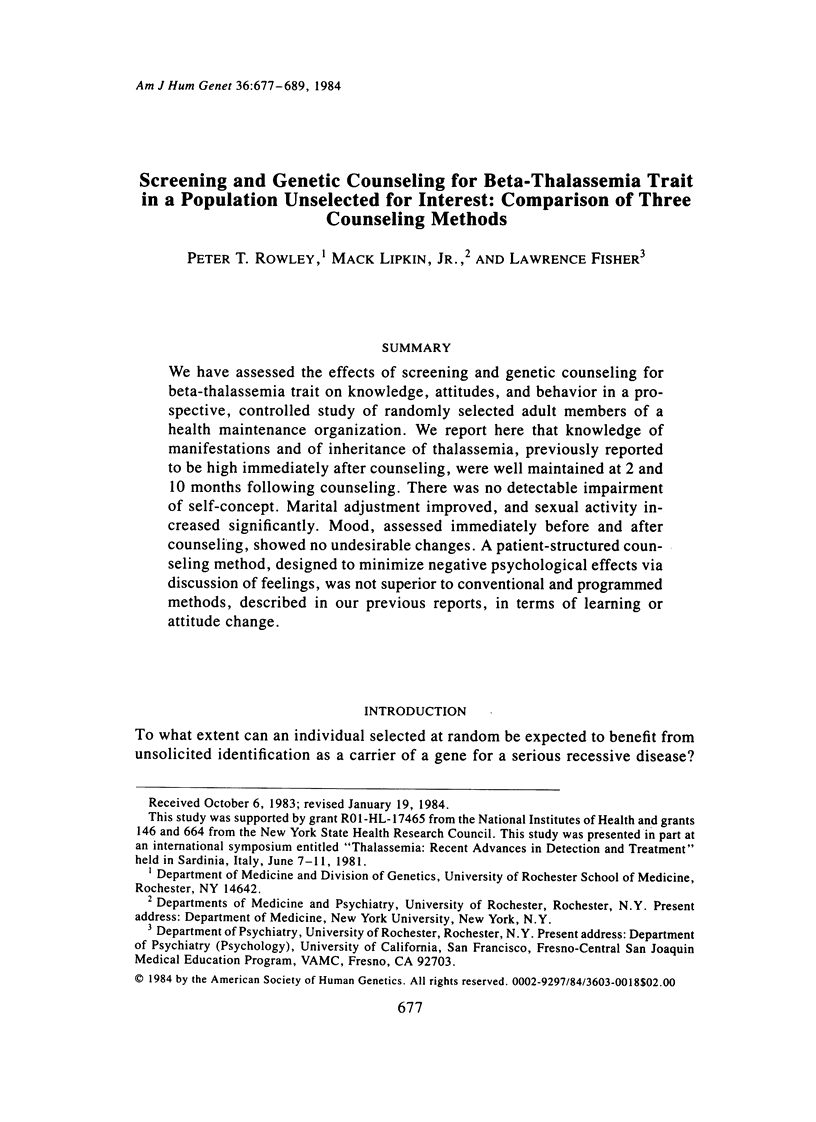
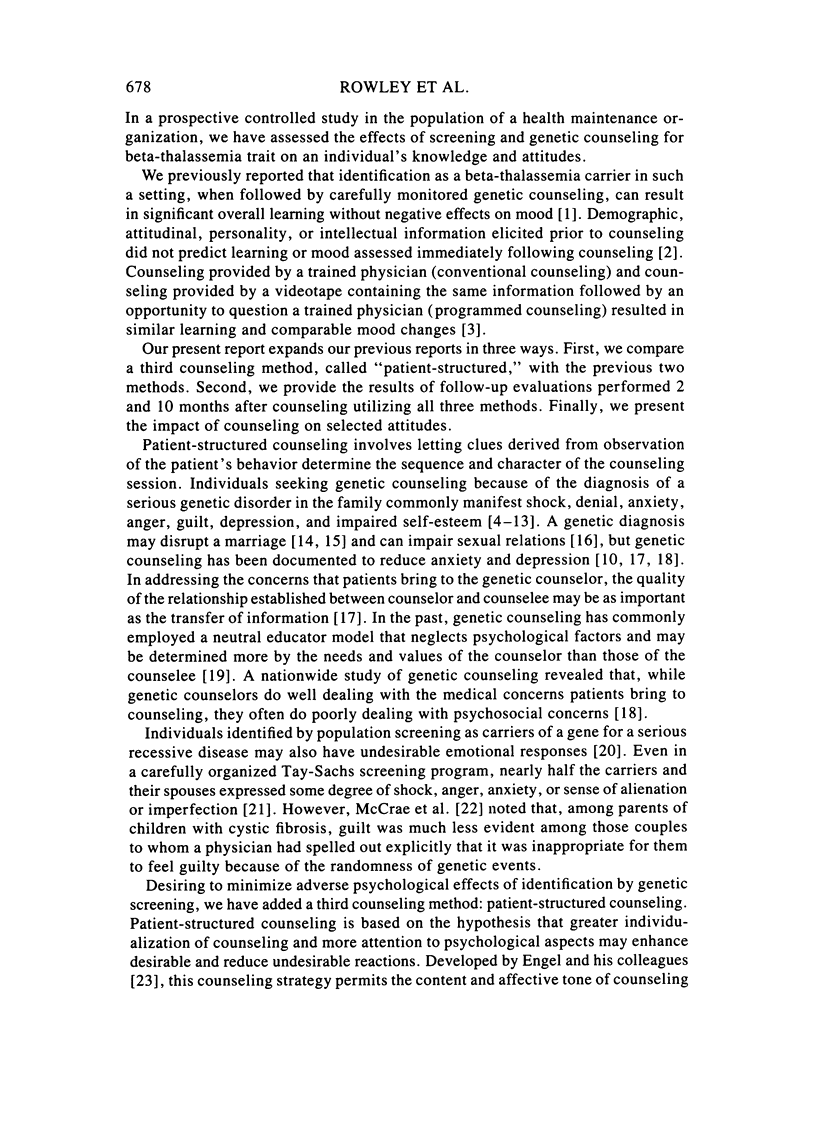
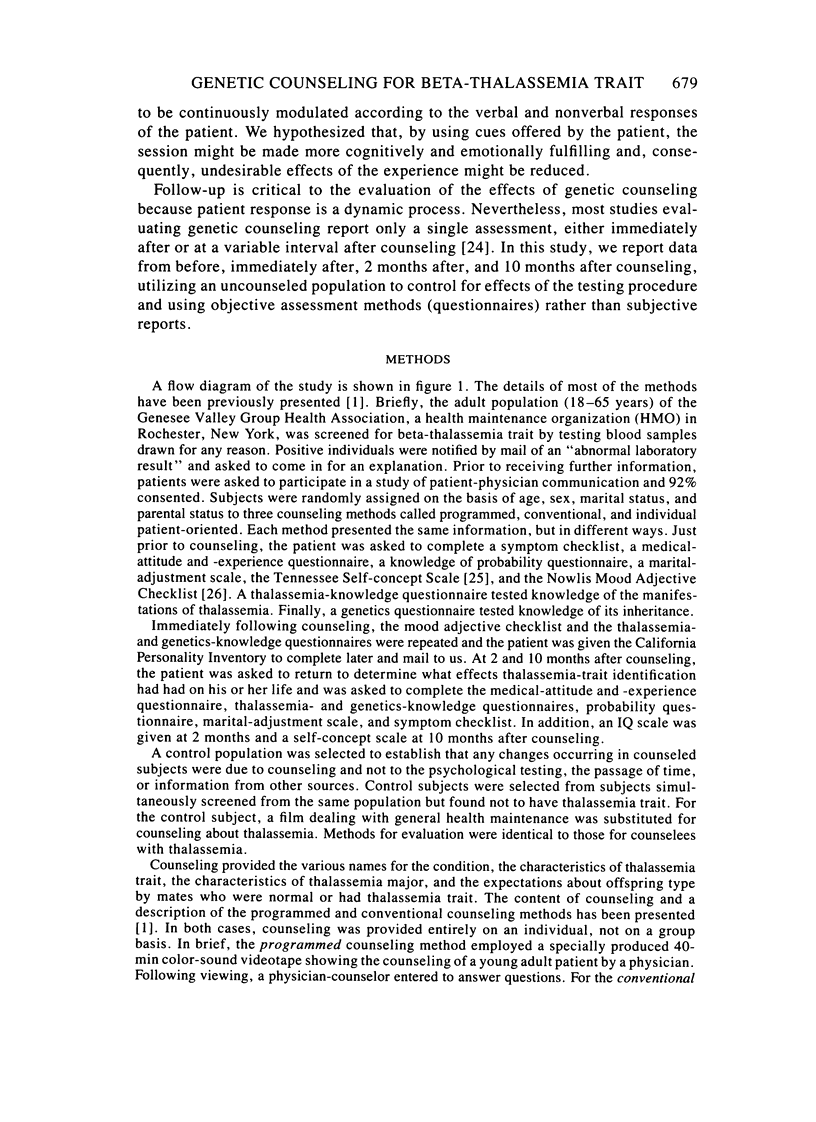
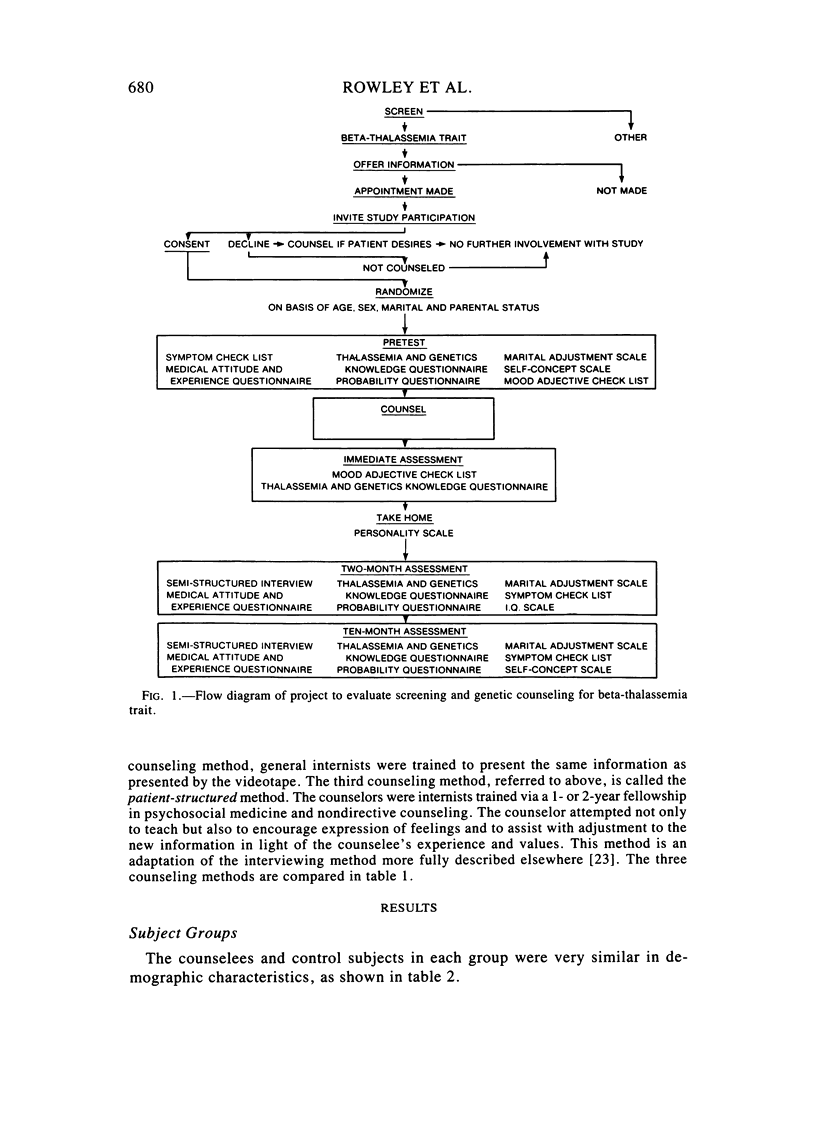
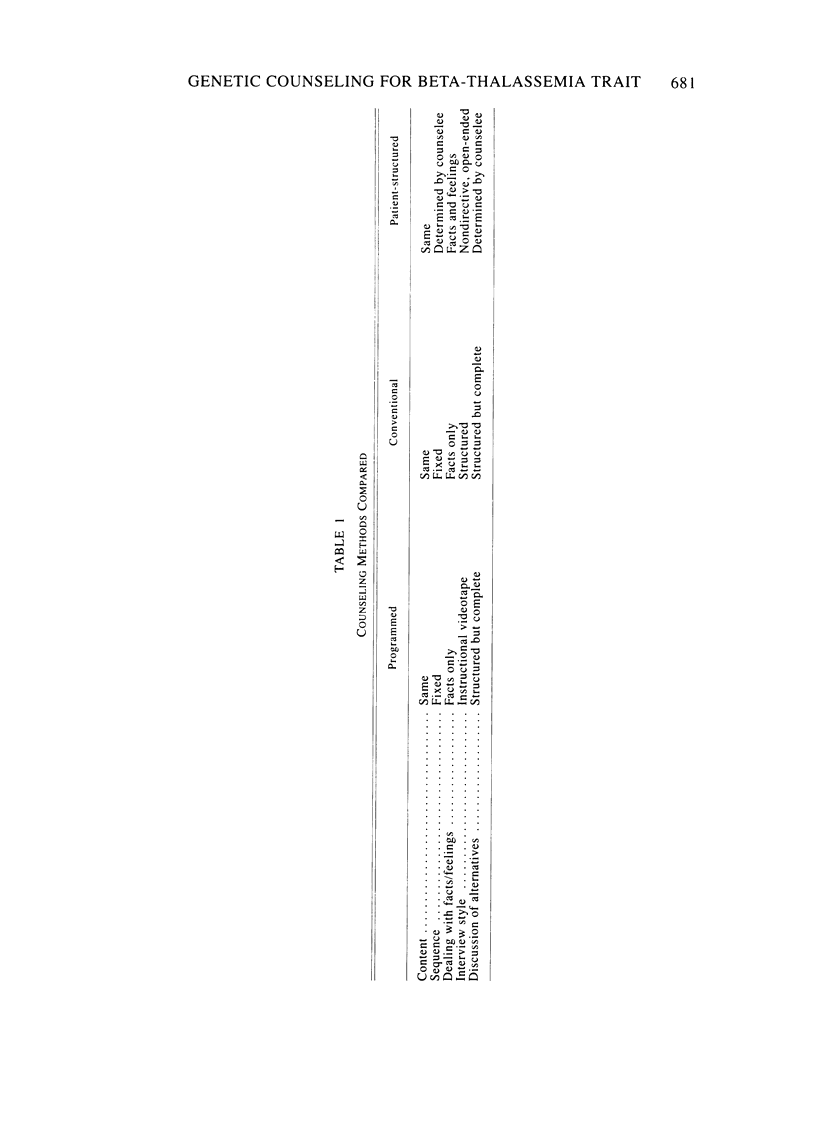
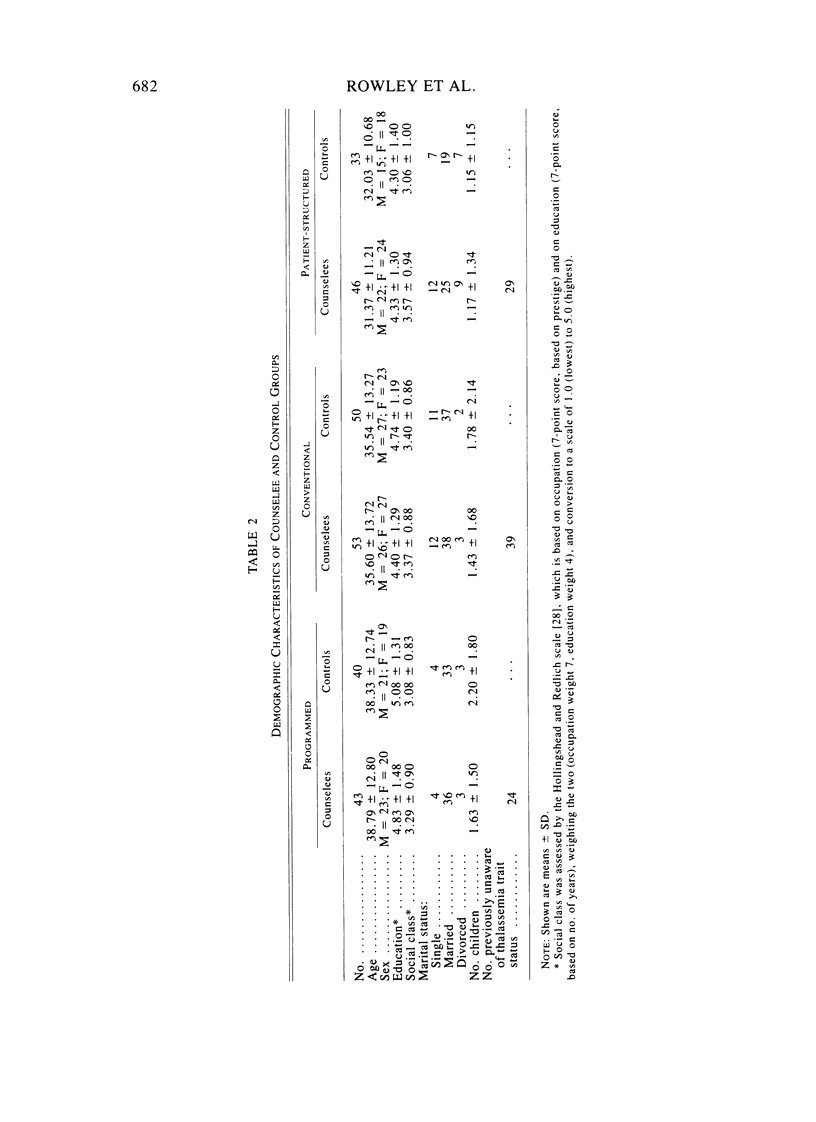
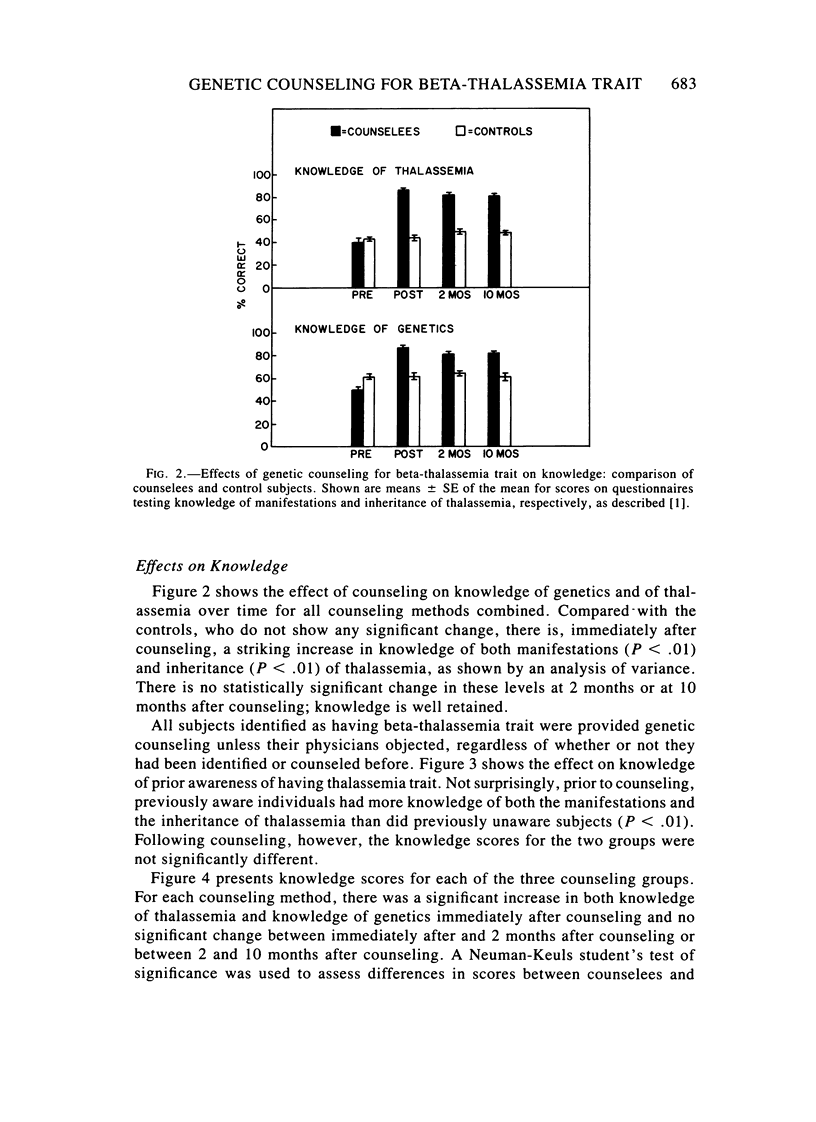
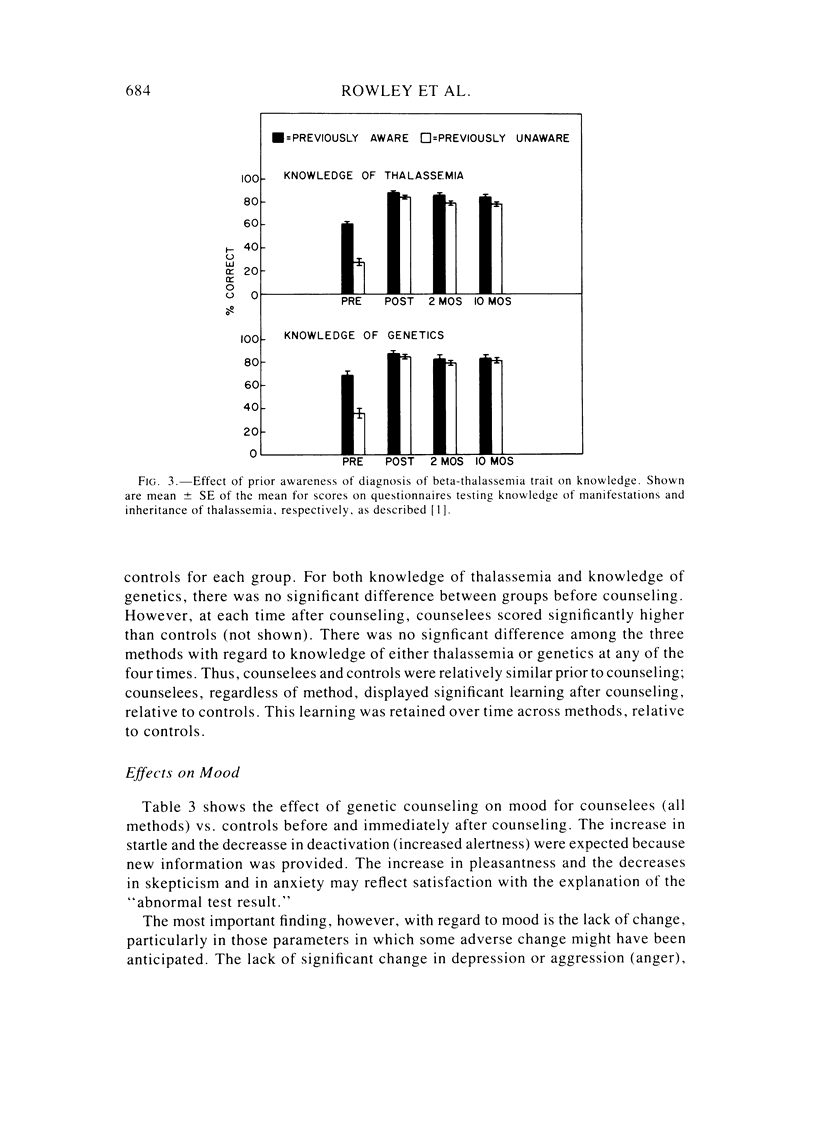
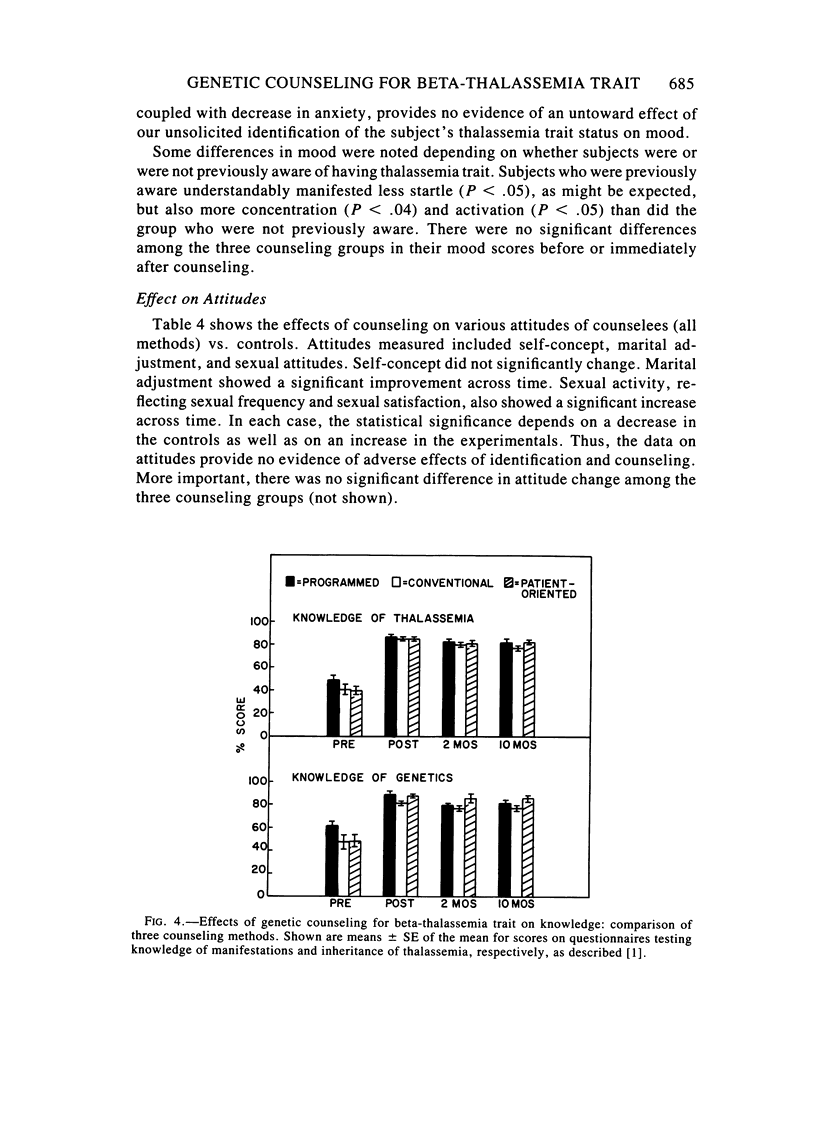
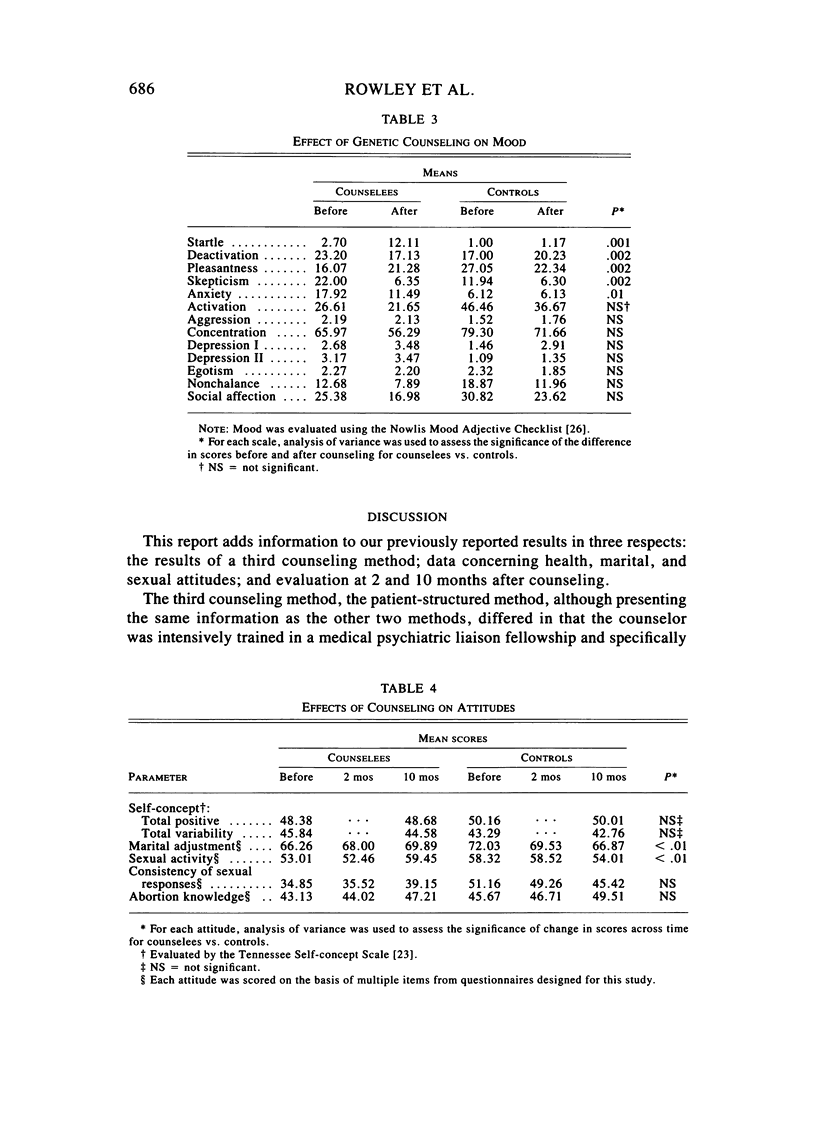
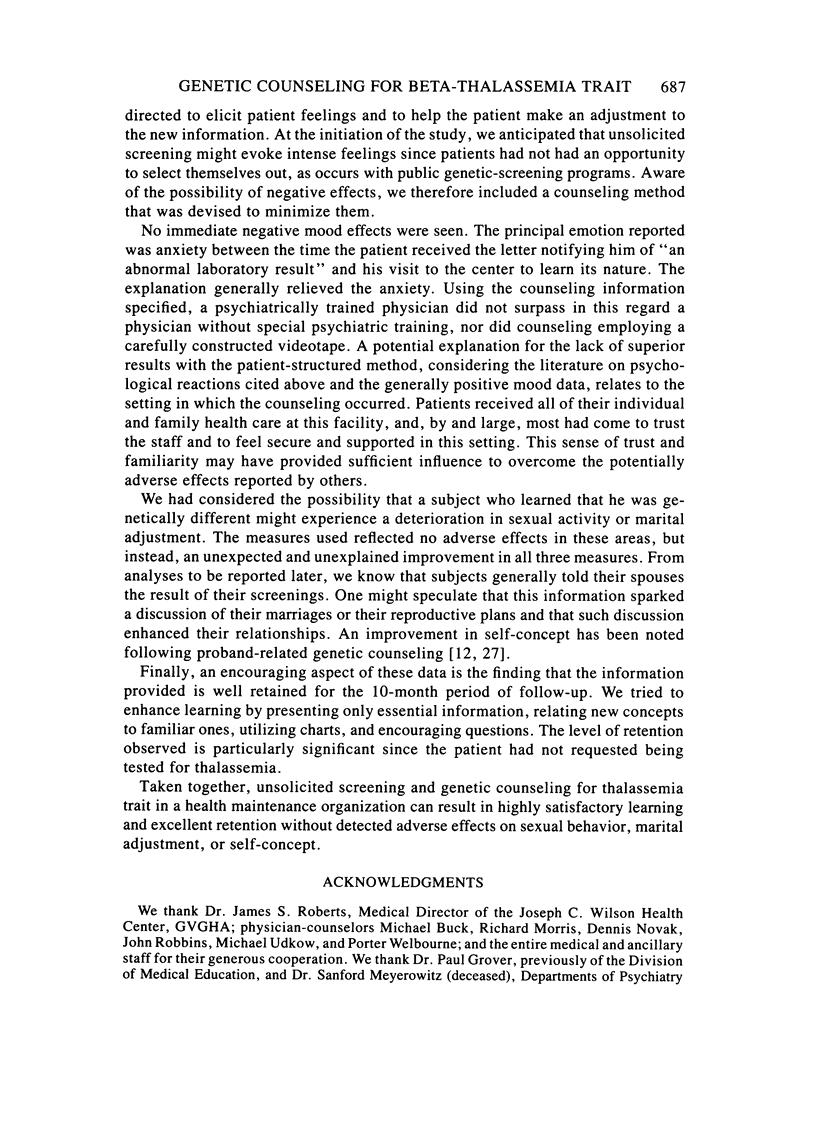
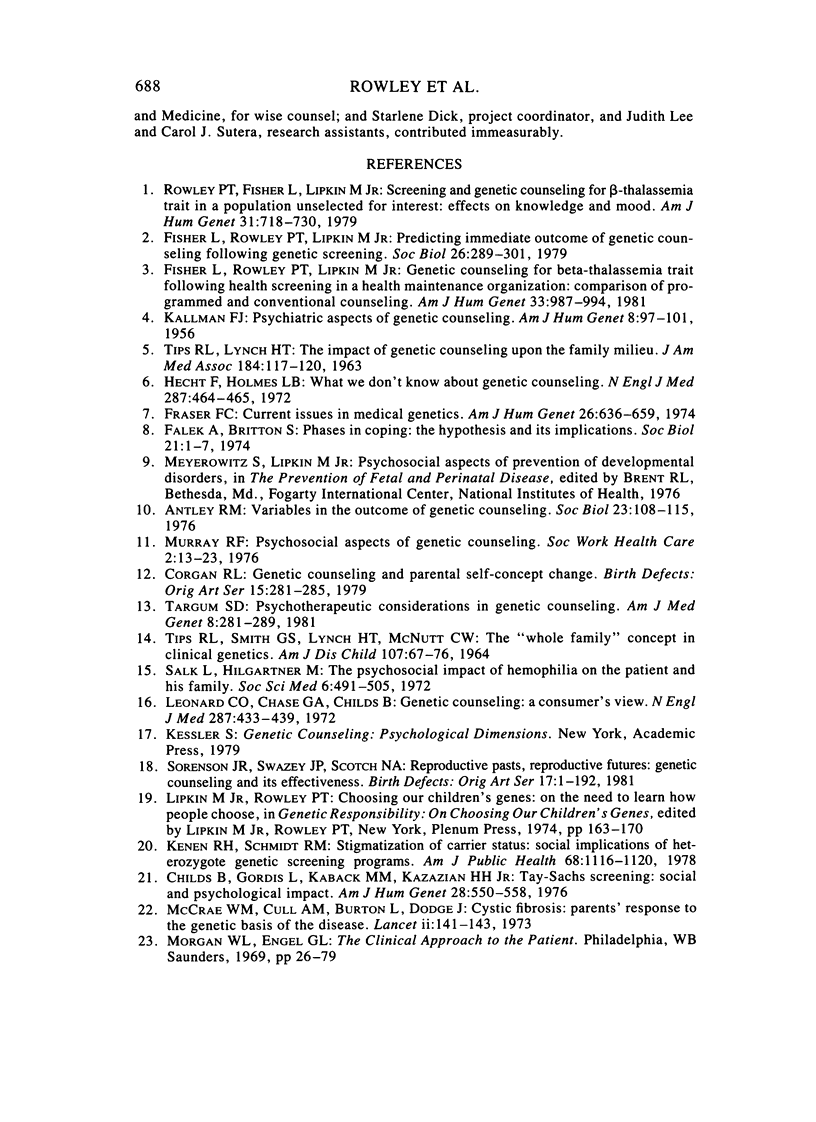
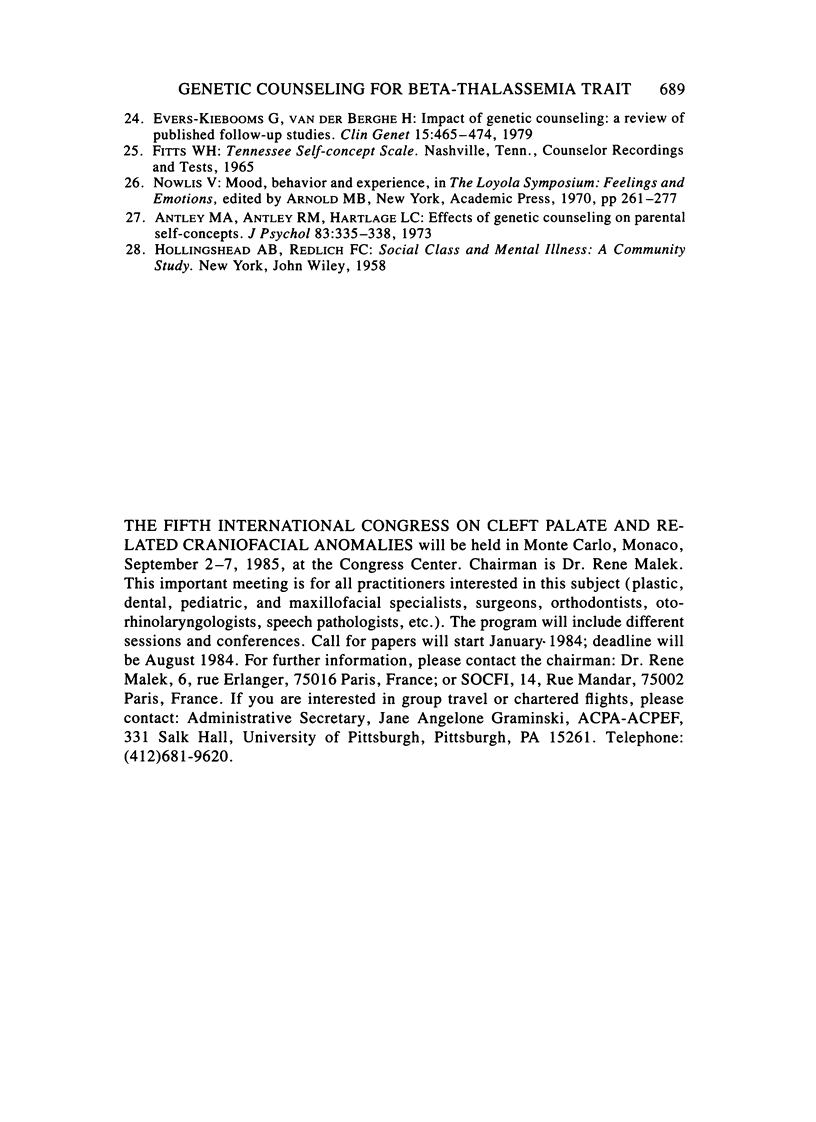
Selected References
These references are in PubMed. This may not be the complete list of references from this article.
- Antley M. A., Antley R. M., Hartlage L. C. Effects of genetic counseling on parental self-concepts. J Psychol. 1973 Mar;83(2D):335–338. doi: 10.1080/00223980.1973.9915623. [DOI] [PubMed] [Google Scholar]
- Antley R. M. Variables in the outcome of genetic counseling. Soc Biol. 1976 SUMMER;23(2):108–115. doi: 10.1080/19485565.1976.9988216. [DOI] [PubMed] [Google Scholar]
- Childs B., Gordis L., Kaback M. M., Kazazian H. H., Jr Tay-Sachs screening: social and psychological impact. Am J Hum Genet. 1976 Nov;28(6):550–558. [PMC free article] [PubMed] [Google Scholar]
- Corgan R. L. Genetic counseling and parental self-concept change. Birth Defects Orig Artic Ser. 1979;15(5C):281–285. [PubMed] [Google Scholar]
- Evers-Kiebooms G., van den Berghe H. Impact of genetic counseling: a review of published follow-up studies. Clin Genet. 1979 Jun;15(6):465–474. doi: 10.1111/j.1399-0004.1979.tb00827.x. [DOI] [PubMed] [Google Scholar]
- Falek A., Britton S. Phases in coping: the hypothesis and its implications. Soc Biol. 1974 Spring;21(1):1–7. doi: 10.1080/19485565.1974.9988084. [DOI] [PubMed] [Google Scholar]
- Fisher L., Rowley P. T., Lipkin M., Jr Genetic counseling for beta-thalassemia trait following health screening in a health maintenance organization: comparison of programmed and conventional counseling. Am J Hum Genet. 1981 Nov;33(6):987–994. [PMC free article] [PubMed] [Google Scholar]
- Fisher L., Rowley P. T., Lipkin M., Jr Predicting immediate outcome of genetic counseling following screening. Soc Biol. 1979 Winter;26(4):289–301. doi: 10.1080/19485565.1979.9988387. [DOI] [PubMed] [Google Scholar]
- Fraser F. C. Genetic counseling. Am J Hum Genet. 1974 Sep;26(5):636–659. [PMC free article] [PubMed] [Google Scholar]
- Hecht F., Holmes L. B. What we don't know about genetic counseling. N Engl J Med. 1972 Aug 31;287(9):464–465. doi: 10.1056/NEJM197208312870911. [DOI] [PubMed] [Google Scholar]
- KALLMANN F. J. Psychiatric aspects of genetic counseling. Am J Hum Genet. 1956 Jun;8(2):97–101. [PMC free article] [PubMed] [Google Scholar]
- Kenen R. H., Schmidt R. M. Stigmatization of carrier status: social implications of heterozygote genetic screening programs. Am J Public Health. 1978 Nov;68(11):1116–1120. doi: 10.2105/ajph.68.11.1116. [DOI] [PMC free article] [PubMed] [Google Scholar]
- Leonard C. O., Chase G. A., Childs B. Genetic counseling: a consumers' view. N Engl J Med. 1972 Aug 31;287(9):433–439. doi: 10.1056/NEJM197208312870904. [DOI] [PubMed] [Google Scholar]
- McCrae W. M., Cull A. M., Burton L., Dodge J. Cystic fibrosis: parents' response to the genetic basis of the disease. Lancet. 1973 Jul 21;2(7821):141–143. doi: 10.1016/s0140-6736(73)93078-x. [DOI] [PubMed] [Google Scholar]
- Murray R. F., Jr Psychosocial aspects of genetic counseling. Soc Work Health Care. 1976 Fall;2(1):13–23. doi: 10.1300/J010v02n01_03. [DOI] [PubMed] [Google Scholar]
- Rowley P. T., Fisher L., Lipkin M., Jr Screening and genetic counseling for beta-thalassemia trait in a population unselected for interest: effects on knowledge and mood. Am J Hum Genet. 1979 Nov;31(6):718–730. [PMC free article] [PubMed] [Google Scholar]
- Salk L., Hilgartner M., Granich B. The psycho-social impact of hemophilia on the patient and his family. Soc Sci Med. 1972 Aug;6(4):491–505. doi: 10.1016/0037-7856(72)90092-3. [DOI] [PubMed] [Google Scholar]
- Sorenson J. R., Swazey J. P., Scotch N. A., Kavanagh C. M., Matthews D. B. Reproductive pasts, reproductive futures. Genetic counseling and its effectiveness. Birth Defects Orig Artic Ser. 1981;17(4):1–192. [PubMed] [Google Scholar]
- TIPS R. L., SMITH G. S., LYNCH H. T., MCNUTT C. W. THE "WHOLE FAMILY" CONCEPT IN CLINICAL GENETICS. Am J Dis Child. 1964 Jan;107:67–76. doi: 10.1001/archpedi.1964.02080060069010. [DOI] [PubMed] [Google Scholar]
- Targum S. D. Psychotherapeutic considerations in genetic counseling. Am J Med Genet. 1981;8(3):281–289. doi: 10.1002/ajmg.1320080305. [DOI] [PubMed] [Google Scholar]


